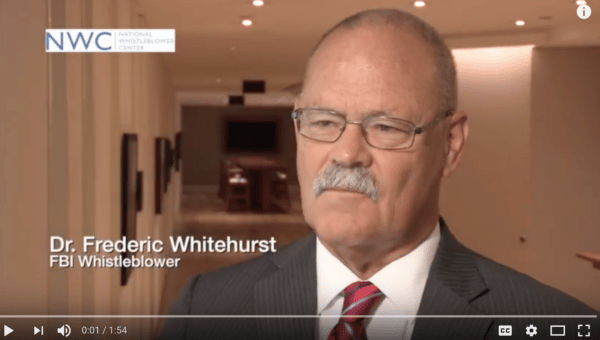When Dr. Frederic Whitehurst initially blew the whistle on the systemic forensic fraud in the FBI crime lab, he could never have known it was the start of a lifelong fight for government accountability.
In 1994, he reported his concerns with FBI lab practices internally. It was “alterations of reports, alterations of evidence, folks testifying outside their areas of expertise in courts of law”, said Whitehurst, but “really what was going on was human rights violations. We have a right to fair trials in this country… And that’s not what was going on at the FBI lab.”
After his superiors failed to take any action, he took his concerns to the Department of Justice. Whitehurst faced significant and ongoing retaliation from the FBI, who highly criticized his claims, attacked his credibility, and fired him from his position at the FBI crime lab as chemist and lab supervisor.
Bad Science and Forensic Fraud
Eventually, investigations were launched into Whitehurst’s allegations but failed to lead to any justice. It wasn’t until ten years later that Whitehurst was finally vindicated, when a scathing 500+ page study of the lab by the Justice Department Inspector General, Michael Bromwich, concluded major reforms were required in the lab. This included the use of forensic hair analyses, which had been used for decades in state and federal criminal cases, and was proven flawed and inaccurate more than ninety percent of the time. Some of the cases Whitehurst had reported included the 1993 World Trade Center attack, the Oklahoma City bombing, and the O.J. Simpson murder case.
As a result, the FBI agreed to unprecedented reforms. These included outside accreditation of its crime lab, the appointment of an objective and independent scientist to oversee lab operations, and the removal of various lab officials who had engaged in misconduct. The FBI pledged to review all cases potentially affected by the lab’s flawed forensic science.
Department of (In)Justice
While Dr. Whitehurst received $1.16 million as settlement from the FBI in 1998, he continued to investigate and research FBI misconduct in cases that used hair analysis, compiling the data as head of the National Whistleblower Center’s (NWC) Forensic Justice Project. It was here that he discovered the Justice Department had failed to keep its promise to review the potentially affected cases and to notify the adversely affected defendants.
In 2012 the Washington Post published an extensive review of the FBI and DOJ failures to properly review the cases impacted by the FBI lab scandal, based on Whitehurst’s research. As a result, the DOJ agreed to conduct yet another review of hair cases in collaboration with the Innocence Project and the National Association of Criminal Defense Lawyers (NACDL).
- 3,000 cases were identified by the government that had used microscopic hair analysis from FBI examiners.
- 500 have been reviewed as of March 2015.
- 268 included pro-prosecution testimony from FBI examiners.
- 257 (96 percent) contained erroneous statements from “FBI experts”.
One example of the many people falsely imprisoned is Donald Eugene Gates, who served twenty-seven years for a violent crime he did not commit before his exoneration.
For some, however, it was too late. Defendants in at least 35 of these cases received the death penalty and errors were identified in 33 (94 percent) of those cases. Nine of these defendants have already been executed and five died of other causes while on death row.
To Serve and Protect
It has taken the FBI and Justice Department more than twenty years to actually review these problems – and the government still does not know the full extent of damage caused by the FBI lab scandal.
But Whitehurst does not regret his decision to blow the whistle on systemic government forensic fraud and corruption. “I took an oath of office and whoever was breaking the law, whoever was committing civil rights violations or human rights violations, I was supposed to do something about it. Yes, absolutely, I’d do it all over again… there have been amazing changes in the FBI laboratory…they are light years ahead of where they were.”
America’s first successful FBI whistleblower, Dr. Frederic Whitehurst, changed the U.S. criminal justice system forever.
Further Reading:
- Watch the short video below to hear Dr. Whitehurst describe his experience blowing the whistle on the FBI.
- Help NWC fight for stronger legal protections for FBI whistleblowers- donate for #GivingTuesday.
- Learn more about Dr. Whitehurst and FBI whistleblower rights.
